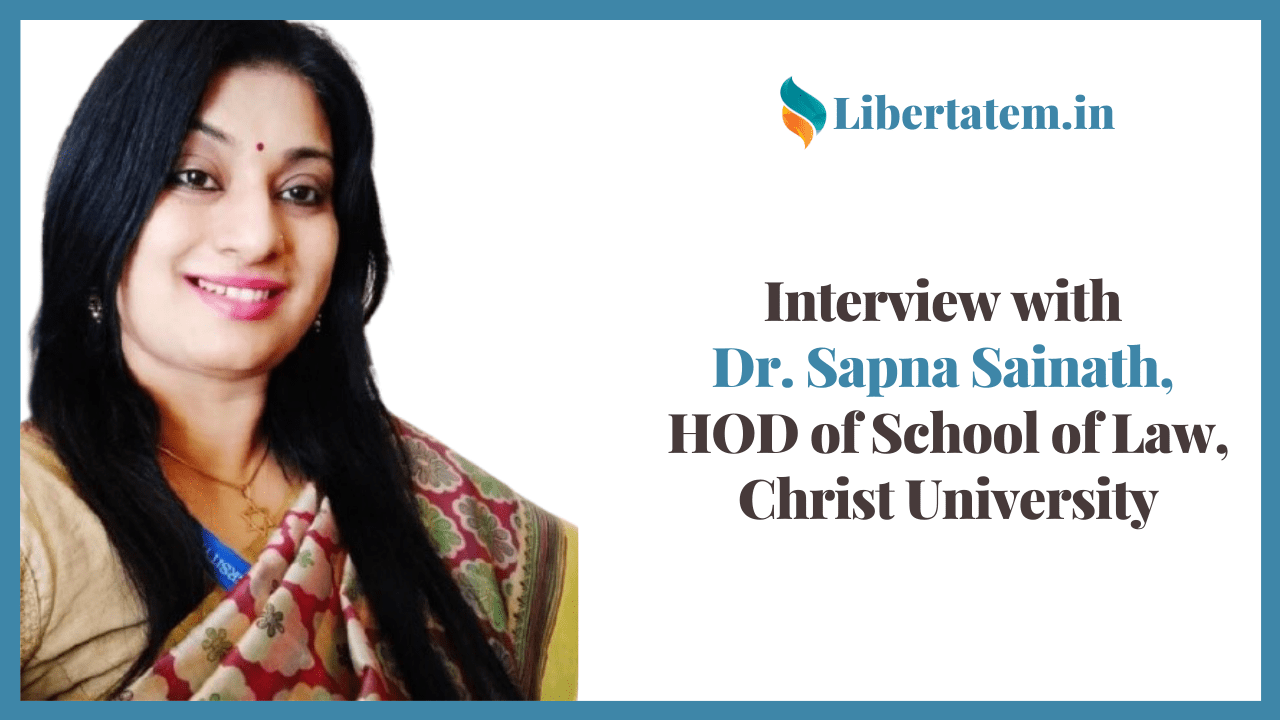Dr. Sapna Sainath is the HOD of School of Law, Christ University and has completed her doctorate from the National Law School of India, University. Apart from this, she is an Agenda Consultant with the Department of Labour, Government of Karnataka and her domain areas include gender studies with a specific focus on women, sexual harassment in a workplace gender and diversity etc.
Prior to her position in Christ University, Dr. Sapna was the principal of Bangalore Institute of Legal Studies, Vijaya College, and the Dean of School of Law, Presidency University.
Rohan Mathew Therattil: What made you decide to pursue a career as a legal academician rather than the conventional approach of practising law?
Dr. Sapna Sainath: I come from a family of advocates. My father is a senior counsel and currently, my brother is in the judiciary. Two decades back when I decided to take up teaching it was more my father‘s choice than mine. I think he identified my aptitude for teaching better than I did myself. Of course, after that, I just took to this field like a fish to water and it has been an enriching experience since then. I have been learning and learning more and more every passing day.
Rohan Mathew Therattil: Do you think that the Indian legal education system has adapted well enough to help future lawyers deal with the problems faced in the modern legal world, and additionally what other changes would you like to see if any?
Dr. Sapna Sainath: Legal education today is nothing like what it was when we were students. One similarity even today is that we still have three streams of legal education in watertight compartments. The state or central universities, private universities and national law universities. The latter two has academic freedom which manifests into specialised elective courses, value-added courses, workshops, training programmes, clinical education and hands-on learning with a sharp focus on employability, entrepreneurship and skill development. This equips the students by removing the theory-practice gap. Exposures in terms of moot court, alternative dispute resolution competitions and Criminal trial competitions which have increased over the years give immense practical exposure to the students. Added to this the internships and judicial clerkship‘s complete the full circle in a students life. This kind of training naturally goes a big way to make them practice-ready instilling in them the professional competence par excellence.
Rohan Mathew Therattil: What are your views with regards to the recent Bar council notification abolishing the one year LLM degree? Additionally, what are your views on doing an LLM abroad as opposed to doing one within India?
Dr. Sapna Sainath: I was a part of the meeting of the Bar Council of India which took a proactive and collaborative approach to study this question. For this academic year, the Bar Council of India has permitted a one-year LLM programme. It certainly deserves appreciation that the Bar Council of India has permitted a one-year LL.M Program. It is certainly commendable that the Bar Council of India is making focused efforts to improve the quality of legal education. So let us, therefore, wait for what the next academic year has to unpack.
In regards to doing an LLM abroad over India, doing an LLM abroad has its value in terms of international exposure and comparative learning that a student can get. But its most important hurting point is the immense cost coupled with a law student not getting a job to repay the loan that he takes. My viewpoint on this is hence, that affordability plays a very important part in course decisions.
Additionally, a student who is serious to enter into practice might find his experience gained from one year of practice more realistic and practical than the experience gained from classroom learning in an LLM abroad.
Rohan Mathew Therattil: The emergence and continuance of the covid 19 pandemic, how do you think this has changed the legal education system within India and additionally do you think any advantages have come out of this change?
Dr. Sapna Sainath: Speaking from experience as heading the school of Law, Christ University, India we have transformed crisis into opportunity. Not only has every activity academic, curricular co-curricular and extracurricular gone on seamlessly in the online mode but what has made it extraordinary is that the online mode has been used to the maximum extent to have experts coming in for our programs from all over the world. We have had collaborations with international universities and have conducted online joint sessions and exchange programmes.
Generally speaking, I think Covid has impacted legal education like it has impacted everything else in the world. The best advantage is the self-paced and asynchronous learning which has taken the center stage, giving students the time and space to explore clinical learning like online internships, online summer schools and online research activities.
Rohan Mathew Therattil: How would you advise students to balance out their extracurricular and co-curricular law school activities to help them both do justice to their academic life as well as having an enjoyable college life as a whole?
Dr. Sapna Sainath: The paradoxical, “law is a jealous mistress”, is what the students are trained from the very beginning of their first year in Law school. Having said that, the holistic development of a student is possible only when he knows to take life by the horns. I have always told my students time management is the key to be busy which makes you fit into the bracket of – “a busy man has time for everything”. This should allow a student to prioritise but at the same time be not deprived of the fabulous lessons he will learn as being in a theatre, in a choir group, Singing dance or sports. As life itself is a balance, this is an experience they need to start being trained early on.


